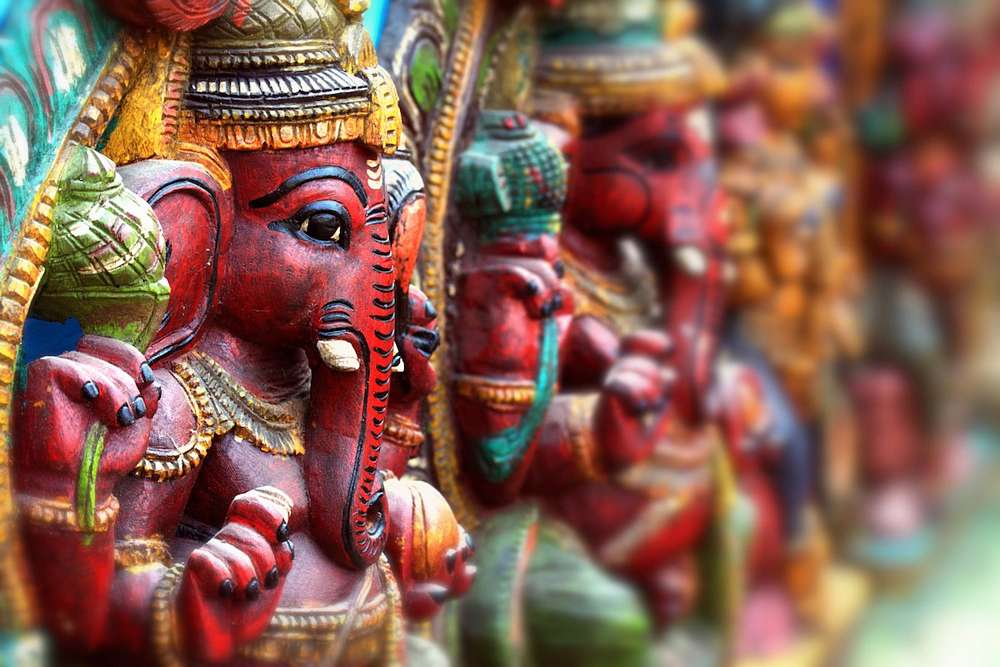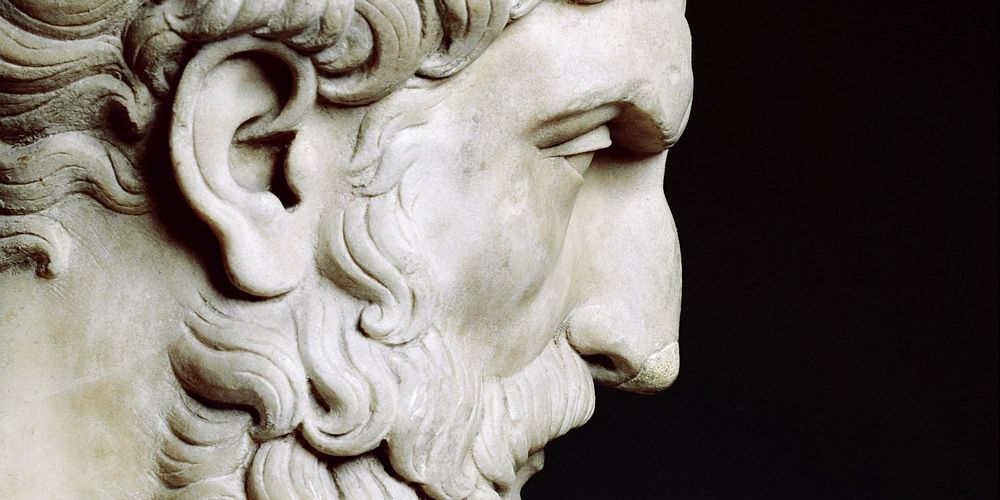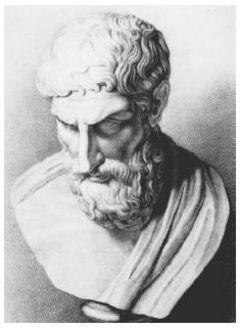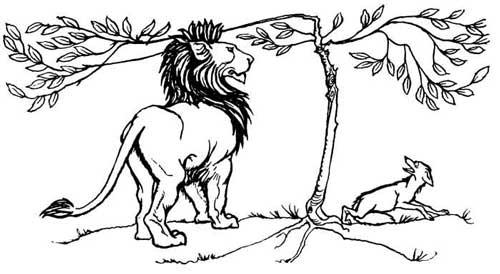
The idea of karma illustrates that every action has consequences that go beyond a mere human lifetime.
Karma is a law of causality that first appeared in the Upanishads, the sacred texts that expound the Vedas, the oldest scriptures of Hinduism, produced in India between c. 1500 and c. 500 BCE. Karma is also a key concept in Buddhism and Jainism.
Mahatma Gandhi once said, “It is God’s inviolable law that karma never fails to produce its effect.”
The term karma means “action” in Sanskrit, and refers to the idea that every action has a specific set of causes and effects. Ethically, karma is a metaphysical record of a person’s moral worth. When someone commits an evil act, they acquire karma; when someone does good, they acquire merit, which cancels out karma. Karma is linked to samsara (the cycle of reincarnation) because when people die, their karma determines the type of rebirth they will have in the next life.
In Hinduism, this is closely tied to the varna (caste) system: a virtuous life eradicates karma and guarantees rebirth in a higher caste that is more capable of attaining moksha, a state of unity between a person’s atman (true self) and Brahman (ultimate reality).
The Meaning of Karma
.jpg) Max Weber wrote in The Religion of India (1916) that “Karma doctrine transformed the world into a strictly rational, ethically-determined cosmos; it represents the most consistent theodicy ever produced by history.” Schools of established Indian philosophy have established more or less sophisticated paradigms of the psychological processes that typify the relations between karma, rebirth, and spiritual fulfillment. Tibetan Dzogchen Lama Sogyal Rinpoche wrote in ‘The Tibetan Book of Living and Dying’,
Max Weber wrote in The Religion of India (1916) that “Karma doctrine transformed the world into a strictly rational, ethically-determined cosmos; it represents the most consistent theodicy ever produced by history.” Schools of established Indian philosophy have established more or less sophisticated paradigms of the psychological processes that typify the relations between karma, rebirth, and spiritual fulfillment. Tibetan Dzogchen Lama Sogyal Rinpoche wrote in ‘The Tibetan Book of Living and Dying’,
In simple terms, what does karma mean? It means that whatever we do, with our body, speech, or mind, will have a corresponding result. Each action, even the smallest, is pregnant with its consequences. It is said by masters that even a little poison can cause death, and even a tiny seed can become a huge tree. And as Buddha said: “Do not overlook negative actions merely because they are small; however small a spark may be, it can burn down a haystack as big as a mountain.” Similarly he said: “Do not overlook tiny good actions, thinking they are of no benefit; even tiny drops of water in the end will fill a huge vessel.” Karma does not decay like external things, or ever become inoperative. It cannot be destroyed “by time, fire, or water.” Its power will never disappear, until it is ripened.
In Buddhism, life is characterized by suffering; the goal of spiritual cultivation is to eradicate karma and attain nirvana, a state in which all karma is nullified and a person can exit the cycle of rebirth. In Jainism, expunging all karma leads to moksha, a blissful state of liberation from samsara. In Hinduism and Buddhism, people receive karma only for intentional acts, whereas in Jainism, even unintentional acts can generate karma.

Understanding Karma
Karma is a principal doctrine to Indian theology and has a similar meaning in both Hindu and Buddhist philosophy. It represents the proposal of universal justice, the conviction that in the end, good will be rewarded and wrong doing penalized. Karma is an objective force functioning to meet out outcomes of actions. The concept of karma is in contradiction of the understandings of the Western Abrahamic beliefs (Judaism, Christianity and Islam) where a personal God adjudicates individual souls at the end of time and dispenses rewards or castigations in proportion to one’s actions in life. Karma is involuntary and not a judgment of one’s conduct but merely a outcome occurring by way of action. .jpg) The Sri Lankan Buddhist monk Walpola Rahula wrote in ‘What the Buddha Taught’
The Sri Lankan Buddhist monk Walpola Rahula wrote in ‘What the Buddha Taught’
The theory of karma should not be confused with so-called “moral justice” or “reward and punishment.” The idea of moral justice, or reward and punishment, arises out of the conception of a supreme being, a God, who sits in judgment, who is a law giver and who decides what is right and wrong. The term “justice” is ambiguous and dangerous, and in its name more harm then good is done to humanity. The theory of karma is the theory of cause and effect, of action and reaction; it is a natural law, which has nothing to do with the idea of justice or reward and punishment.
Every volitional action produces its effects and results. If a good action produces good effects and a bad action bad effects, it is not justice, or reward, or punishment meted out by anybody or any power sitting in judgment on your action, but this is in virtue of its own nature, its own law. This is not difficult to understand. But what is difficult is that, according to the karma theory, the effects of a volitional action may continue to manifest themselves even in a life after death.’
Karma is Complex
.jpg) Karma is frequently spoken of as the law of return, that whatsoever you spread toward others in behavior will return in due course. Contrasting the Western monotheism which postulates only one life for each person, in Eastern beliefs the individual has an entire series of lifespans in which to progress their spiritual and ethical development. The wheel of existence in both Hindu and Buddhist thought is a series of births, lives, and deaths over infinite eons. The individual soul or karmic core gets passed along through consecutive incarnations until spiritual development leads to final union with the divine ground of Being. In Hinduism this is viewed as Brahman, and in Buddhism, this is simply termed enlightenment, or the fully awakened state.
Karma is frequently spoken of as the law of return, that whatsoever you spread toward others in behavior will return in due course. Contrasting the Western monotheism which postulates only one life for each person, in Eastern beliefs the individual has an entire series of lifespans in which to progress their spiritual and ethical development. The wheel of existence in both Hindu and Buddhist thought is a series of births, lives, and deaths over infinite eons. The individual soul or karmic core gets passed along through consecutive incarnations until spiritual development leads to final union with the divine ground of Being. In Hinduism this is viewed as Brahman, and in Buddhism, this is simply termed enlightenment, or the fully awakened state.
Karma has become a popular term in New Age spirituality; all actions can be good or bad karma, contingent on their ethical characteristics. The Lama Traleg Kyabgon Rinpoche wrote in ‘Karma: What It Is, What It Isn’t, Why It Matters’,
The Buddha, radically interpreted the individual as a compound of many different elements, physical and mental – a psychophysical complex. Therefore our feelings, thoughts, emotions, memories, dispositions; our perceptual capability, our cognitive capacities, and our physical conditions – all are constantly interacting and impacting each other.
And agents themselves are also continually interacting with other agents. Logically, then, we need not compelled to identify ourselves with a single thing, a core element to our psyche, as it is really a matter of being in a state of flux. In this sense, karma could be said to operate as streams of networking karmic processes, where all kinds of living, breathing individuals are involved. The really important principle to grasp about this approach is to look closely at things, for things in their nature are complex. Acknowledging this will bring us great reward in fact. Doing the opposite, looking at things in a very simple way, keeps us trapped in ignorance.
Due to the prevalence of Hinduism and Buddhism throughout Asia, karma has become a central moral paradigm. The doctrine of karma has influenced the spiritual beliefs of numerous traditions, including Sikhism, Falun Gong, and Theosophy.

 What is happy and imperishable suffers no trouble itself, nor does it cause trouble to anything. So it is not subject to feelings either of anger or of partiality, for these feelings exist only in what is weak.
What is happy and imperishable suffers no trouble itself, nor does it cause trouble to anything. So it is not subject to feelings either of anger or of partiality, for these feelings exist only in what is weak..jpg) Of all the things that wisdom provides for the happiness of a whole life, the most important by far is acquiring friends.
Of all the things that wisdom provides for the happiness of a whole life, the most important by far is acquiring friends.


.jpg)

.jpg)
.jpg)

.jpg)

.jpg)
.jpg)

.jpg)
.jpg)

.jpg)
.jpg)